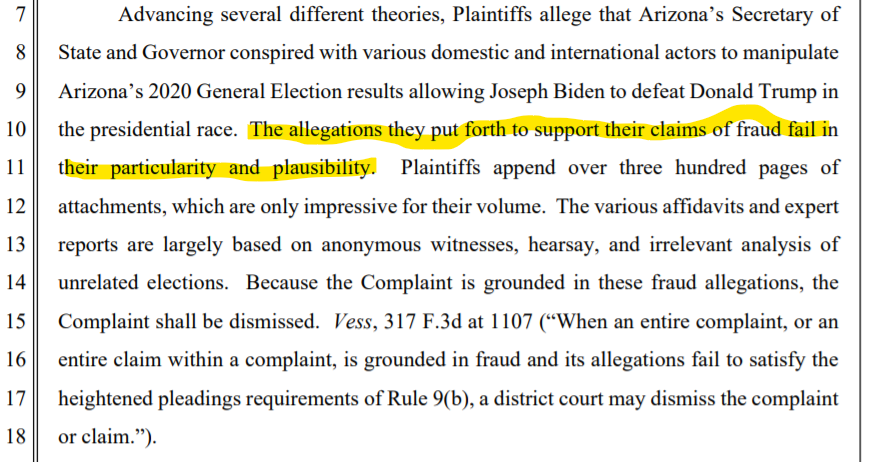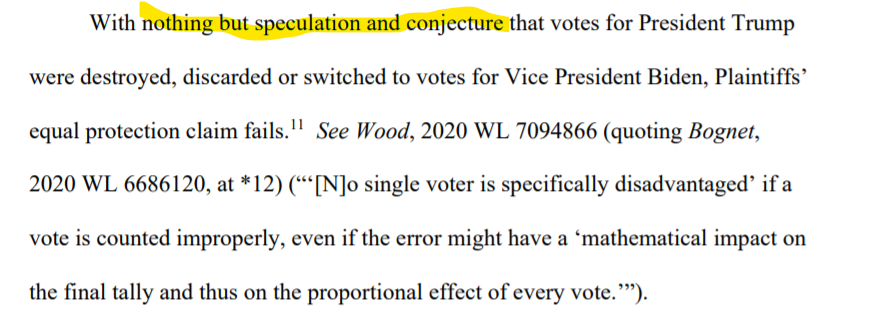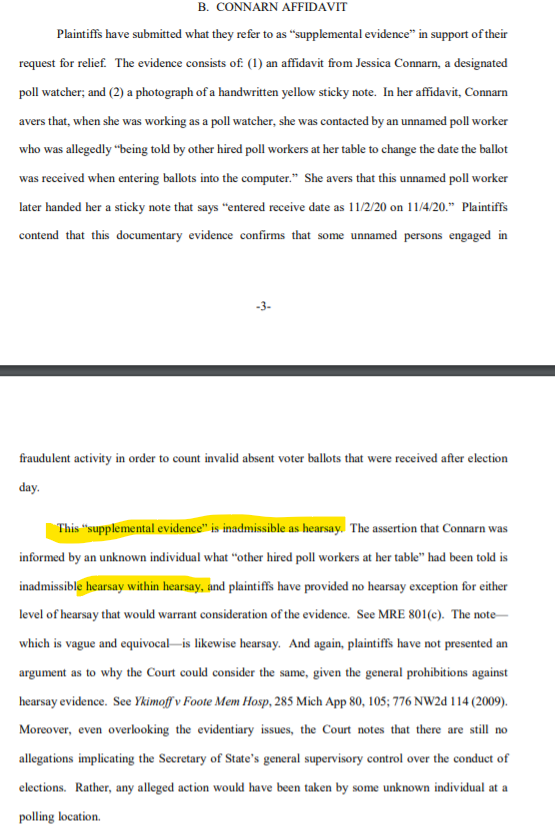It a 36-page opinion.
And it starts out strong.
ACK - my bad -
Sorry. I'm tweeting without caffeine and it shows. The order rejects the injunction, but it doesn't dismiss the case (yet). Skimming ahead, that appears a foregone conclusion, but technically the case isn't dismissed.
Seriously, though - this is yet another judge who is responding to these request to overturn the election with the judicial version of "you want me to *what*? Hard pass."
The judge is being kind to the plaintiffs here and doesn't mention the epiceyeburningdisasterthatwastheoriginalcomplaint. But you'll note that the judge also doesn't mention what claims were in that complaint or whether they are the same as the ones in the 1st Amended Complaint.
(I'm jumping past some material that's not all that noteworthy or important - busy day today on many levels, so not a lot of time.)
This is stated mildly, but it's a bit of a benchslap. It's very much "you really didn't do anything right and I had to remind you about things you should have done days earlier."
For the nonlawyers:
"Benchslap" is an official term of art, and is defined in Black's Law Dictionary. See below.
And noting that the rapid pace of these proceedings is the result of plaintiff's requests, so Sidney is getting what she asked for here.
It looks like this is - no real surprise - going to be another one of those "you lose for all of the reasons" opinions.
I didn't look too closely at the sovereign immunity issues in this case, but I did see they were briefed by MI. It appears that they were briefed very well.
The exception that allows prospective injunctive relief to end a continuing violation is, as the court points out, narrow.
On this court's reading, all the Kraken suits should be done and dismissed on these grounds, I think.
This passage also goes to why the SCOTUS petition in the Pennsylvania case is on very shaky ground, to put it mildly. That case is trying to disguise a request that SCOTUS instruct a state court on how to conform to state law as a constitutional claim. It's not well-disguised.
As the court points out, the defense is arguing that all the federal claims that Sidney raised are really just state law claims in a cheap disguise.
Not only does the court agree, it somewhat gratuitously quotes a bit of the Defense's snark about the insane nature of these claims when it does it.
Footnote 2 is interesting. No reason is given, but I don't think one is really necessary.
This makes it clear that dismissal is inevitable. That will be handled separately, but if the claims are barred by the 11th Amendment, they must be dismissed.
The first paragraph of the mootness section is succinct.
The court points out that plaintiffs failed to use the MI law procedures for challenging an election, which locks them out of most of the relief they wanted, and that there's no point to letting them look at machines if they have no case.
And, quoting both the 11th Circuit in Wood v Raffensperger and Justice Wecht's concurrence in the PA Supreme Court's ruling in Kelly, finds that there's no basis in law for a court to undo an election by telling the legislature to appoint electors. So the case is also moot.
But wait! There's more!
Let's talk about laches, because laches is another reason Sidney loses.
You'll notice that one of the things the court points to is Sidney's lengthy delay in bothering to serve the defendants. That kind of thing really does matter. (Of course, all the other delays didn't help either.)
Nice use of scare quotes here.
The court finds that there was unreasonable delay - based in part on the Plaintiffs' own concessions.
And that there is prejudice to the defendants. So the plaintiffs also lose on laches.
For the nonlawyers:
Abstention is a doctrine where federal courts decline to rule in a case even if they otherwise could to give the state courts a chance to weigh in on the matter. There are a few variants. It's technical; I'm going to skip past most of it.
But the court finds that abstention is warranted.
And we're still not done! We haven't talked about standing yet. So let's talk about standing.
There's no standing for the equal protection claim. There's also no standing for the Elections Clause and Electors Clause claims.
(I skipped a bunch of material there.)
So - for those keeping score:
The defendants lose because: 11th Amendment, mootness, laches, abstention, and standing.
With that out of the way, it's time to look at the merits of the request for injunctive relief.
The court goes on to find that even if none of those reasons to lose the whole case applied, the plaintiffs would still lose the Elections & Electors Clause claims.
And it looks like the Court read the affidavits carefully enough to see that they didn't actually allege anything real.
So there's no likelihood of success on the merits for Equal Protection either.
And, as most of the lawyers weighing in on these cases have pointed out, federal courts Do Not Like theories that would make every violation of the law a federal matter.
And even the court was done at this point - it's just "oh, and none of the other factors for injunctive relief work for you either."
Oh, and it looks like Judge Parker was very aware of the real purpose of the lawsuit, and wasn't a fan. At all.
Seriously, that was brutal. It won't deter Sidney, of course, because Sidney is all the nuts. But it should.
This was a "you lose for all the reasons" ruling. The case may technically not be buried, but it's a zombie at this point - all that's left is to finish it off.
So that's one tentacle down. Several to go.
/fin
PS - but if you want more, it looks like Akiva is just getting started with his take.
https://t.co/gMyu2IyODj






























